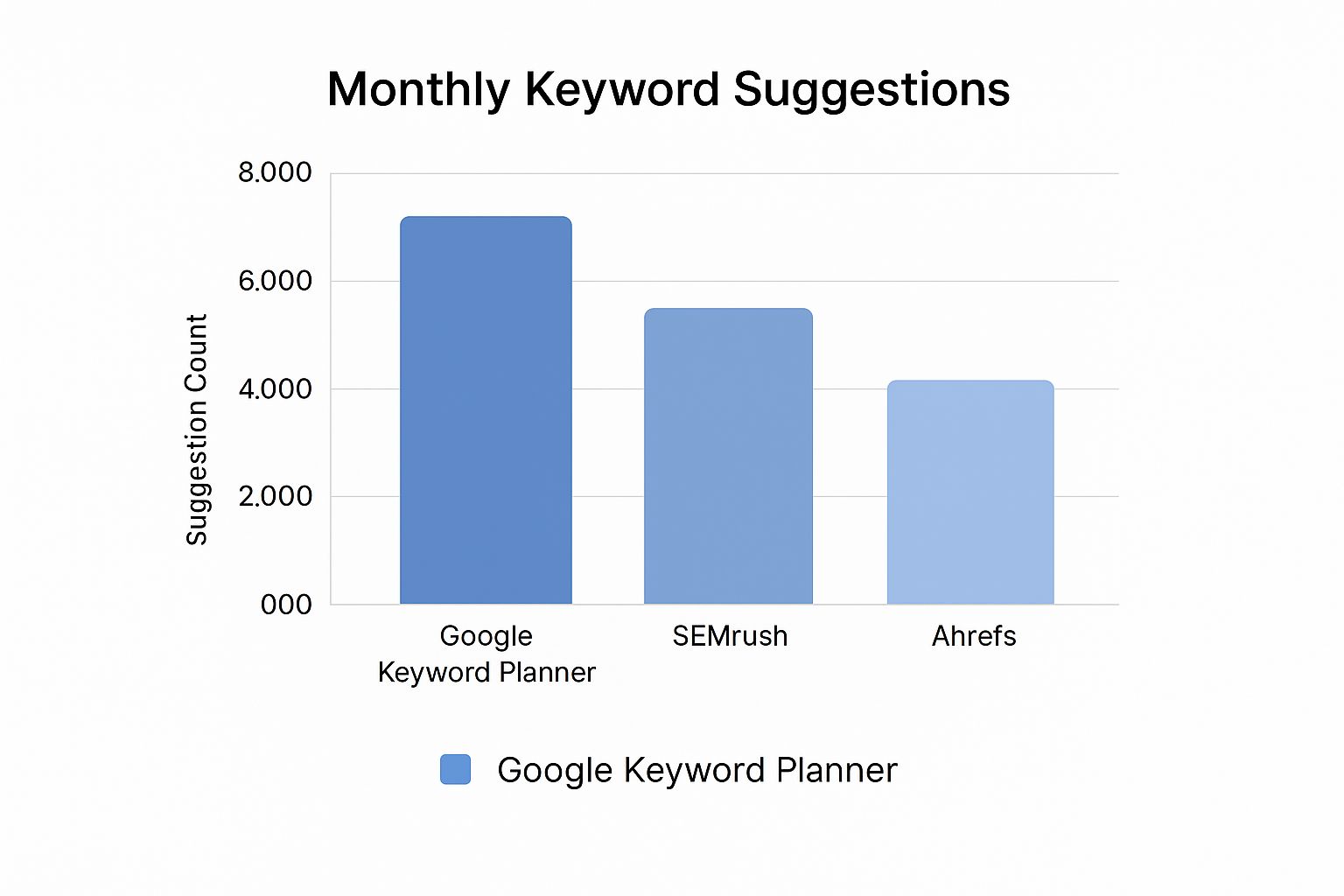Why Keyword Research Changes Everything for New Marketers

Many new websites struggle to gain visibility. They often overlook a crucial element: keyword research. Keyword research isn't simply another SEO task. It's the foundation of a successful online presence. It acts as a roadmap, guiding content creation toward topics that resonate with your target audience.
The Power of Understanding Search Intent
Imagine two websites selling handcrafted jewelry. One creates content based on what they find interesting. The other uses keyword research to understand what their customers are searching for. The second website is more likely to attract organic traffic.
This is because they align their content with actual user needs and search queries. This targeted approach connects potential customers directly with relevant products. Understanding search intent – the reason behind a user's search – is paramount.
Early Keyword Research Mastery: A Competitive Edge
New marketers who prioritize keyword research gain a significant advantage. They learn to create content that answers questions and addresses needs, converting browsers into buyers. This data-driven approach allows for efficient resource allocation, focusing on content designed to rank well. For more strategies on boosting online visibility, check out this guide: How to Master Beginner SEO Tips.
Keyword Research: The Foundation of SEO Success
Keyword research is fundamentally linked to the broader SEO landscape. The field is experiencing remarkable growth, highlighting its increasing importance. The global SEO market, which includes keyword research, was valued at $82.3 billion in 2023. It is projected to reach $143.9 billion by 2030.
This growth demonstrates the crucial role of keyword research in digital marketing. Additionally, 58% of SEO professionals recognize the significant influence of AI, increasing competition. Understanding these trends is essential for new marketers. You can find more detailed statistics here.
Keyword research isn't just about numbers. It's about understanding the psychology of search behavior. It's about anticipating audience needs and delivering satisfying content. Learn more about improving your search ranking: How to Rank Higher on Google. By mastering keyword research, new marketers can significantly improve online visibility and build a strong foundation for long-term success.
Decoding What People Really Want When They Search

Keyword research for beginners often prioritizes high-volume keywords. However, this approach can neglect a critical component: search intent. Search intent is the fundamental reason behind a user's search query. Understanding this basic principle is essential, especially for those just starting out. Just like learning to drive, mastering the fundamentals is key. You can find helpful driving tips for beginners which offer a good analogy for any new skill.
The Three Pillars of Search Intent
Search intent generally falls into three main categories:
- Informational: The user wants to learn something. For example, someone searching "how to bake a cake" seeks instructions, not a bakery.
- Navigational: The user wants to find a specific website or place. Searching for "Facebook login" indicates a desire to go directly to Facebook's login page.
- Transactional: The user wants to buy something. A search like "buy iPhone 15" shows a strong intent to purchase.
Why Matching Intent Matters
Matching search intent is more critical than simply using high-volume keywords. Imagine searching for "how to bake a cake" and landing on a website selling cakes. The mismatch is frustrating. This is why aligning content with user intent is vital for effective keyword research.
Keyword research tools are essential for identifying and optimizing keywords. The market for these tools is projected to grow significantly, with a compound annual growth rate (CAGR) available in detailed market reports. These tools help beginners understand search intent, which can be informational, navigational, or a combination. For instance, in June 2023, 17% of top global search terms were informational, while 54% were navigational. Learn more about the Keyword Research Tools Market.
Using these tools like Semrush or Ahrefs can dramatically improve a website's visibility on search engines like Google and Bing. This understanding ensures that you attract the right visitors—those genuinely interested in what you offer.
Your Toolkit for Discovering Winning Keywords

The chart above illustrates the monthly keyword suggestions from three popular tools: Google Keyword Planner, SEMrush, and Ahrefs. Google Keyword Planner generates the most suggestions, followed by SEMrush, and then Ahrefs. This difference highlights the varying strengths of each tool, especially for those new to keyword research.
Free Vs. Paid: Choosing The Right Tool
For beginners, free keyword research tools like Google Keyword Planner are an excellent starting point. These tools allow you to grasp the fundamentals without any financial commitment. However, free tools often have limitations regarding data depth and advanced functionality.
For instance, Google Keyword Planner primarily focuses on keywords related to Google Ads campaigns. While helpful for understanding search volume, it may not provide the comprehensive data necessary for organic SEO.
Leveraging The Power of Premium Tools
Premium keyword research tools like SEMrush and Ahrefs provide more advanced features. These include competitor analysis, backlink tracking, and in-depth keyword difficulty analysis. These tools can be valuable investments as your SEO skills and website develop. However, they do come with a monthly subscription fee, an important factor for beginners with budget constraints.
- SEMrush: This versatile tool offers a wide array of features beyond keyword research, making it a valuable asset for serious marketers.
- Ahrefs: Known for its robust backlink analysis, Ahrefs helps you understand competitor link-building strategies and identify opportunities for your own.
To help you choose the best tool for your needs, take a look at the comparison table below:
Beginner-Friendly Keyword Research Tools Comparison
Compare features, pricing, and best use cases for the most popular keyword research tools suitable for beginners.
| Tool Name | Price | Best For | Key Features | Difficulty Level |
|---|---|---|---|---|
| Google Keyword Planner | Free | Beginners, basic keyword research, Google Ads campaigns | Search volume data, keyword ideas, ad campaign planning | Easy |
| SEMrush | Paid (starting from $119.95/month) | Intermediate to advanced users, competitor analysis, comprehensive SEO | Keyword research, competitor analysis, backlink tracking, site audit, rank tracking | Medium |
| Ahrefs | Paid (starting from $99/month) | Advanced users, backlink analysis, competitive research | Keyword research, backlink analysis, content explorer, rank tracking, site audit | Medium to Hard |
This table provides a quick overview of the key differences between the tools discussed. Choosing the right tool will depend on your individual budget and needs.
Combining Tools for Comprehensive Keyword Intelligence
Many successful marketers use a combination of free and paid tools for a complete understanding of the keyword landscape. You might start with Google Keyword Planner to generate initial ideas, then use SEMrush or Ahrefs to analyze keyword difficulty, competition, and search intent. This combined approach is a powerful strategy for beginners and experienced SEOs.
Finding Your Perfect Workflow
The best keyword research tools are the ones that align with your specific needs and budget. Experiment to find the tools that streamline your process. Keyword research is crucial for driving website traffic, much like optimizing product keyword rankings for e-commerce. The guide on Ecommerce SEO Best Practices offers further insights. As your needs change, investing in premium tools may become a worthwhile investment to boost your SEO performance.
Discovering Keywords That Actually Drive Results
So, you've learned keyword research basics and explored some helpful tools. Now, let's bridge the gap between theory and practical application. Here's how to identify keywords that deliver tangible results—increased website traffic and conversions.
Balancing Search Volume and Competition
Effective keyword research requires balance. You need keywords with sufficient search volume to attract a sizable audience. However, intense competition can bury your content, especially when starting out. Understanding keyword difficulty is crucial.
The Long Tail: Your Secret Weapon
High-volume keywords are tempting, but consider long-tail keywords. These longer, more specific phrases often have lower search volume but higher conversion rates. Instead of targeting "shoes," a highly competitive term, try "best running shoes for flat feet women." This long-tail keyword targets a specific audience with a particular need.
Real-World Keyword Breakthroughs
Many beginners succeed with long-tail keywords. Imagine a new blogger targeting "healthy recipes," a broad term. By narrowing their focus to "healthy vegan gluten-free dessert recipes," they reach a niche audience actively searching for that specific content. This targeted approach often leads to higher click-through rates and conversions. Understanding search volume and keyword trends is vital. As of early 2025, "YouTube" remained the most searched keyword globally, with approximately 102.1 million monthly searches. This demonstrates how beginners can use popular keywords to attract visitors. It also highlights that most web pages receive no traffic from Google, emphasizing the importance of strategic keyword selection. Find more detailed statistics here. By focusing on relevant high-traffic keywords and understanding user intent, you can develop effective SEO strategies that yield real results.
Evaluating Keyword Difficulty and Spotting Trends
To find winning keywords, research search engine optimization strategies: Ecommerce SEO Best Practices. Realistically assessing keyword difficulty is essential. Several tools provide keyword difficulty scores, indicating how challenging ranking for a specific keyword will be. Understanding seasonal trends is also important, as search behavior changes throughout the year. For instance, "winter coats" see higher search volume during colder months.
Speaking Your Audience's Language
Effective keyword research is about finding terms your audience actually uses. Think like your target customer. What would they search for? By understanding their language, you can create content that resonates and drives meaningful results.
Smart Competition Analysis Without Getting Overwhelmed

Smart keyword research for beginners means understanding your competition. Success comes from analyzing competitors effectively, without feeling intimidated. It’s about discovering attainable opportunities that align with your website's current authority and resources.
Evaluating Competing Content: Spotting Opportunities
Keyword research is like solving a puzzle. Your competitors hold some pieces, but gaps exist. Analyzing their content reveals these gaps and uncovers keywords they’ve missed.
This goes beyond simply checking which keywords they use. It involves assessing their content quality, depth, and overall strategy. For further reading, check out this helpful article: How to master SEO competitor analysis.
Assessing Realistic Competition
Not every keyword is worth pursuing, especially when starting out. A keyword with high search volume might seem tempting, but if the top search results are dominated by established websites, ranking will be a challenge.
Realistically assess keyword difficulty to avoid wasted time and effort. Concentrate on keywords where you have a genuine chance to outrank the competition, considering your current resources and authority.
Finding Competitor Blind Spots and Strategic Positioning
Even large competitors have vulnerabilities. They might overlook long-tail keywords or specific niche topics. These overlooked areas are often easier to rank for and can bring in highly targeted traffic.
Focusing on these blind spots allows beginners to establish their presence in a competitive market. Consider a small bookstore competing with Amazon. Competing directly on the keyword "books" is difficult. However, targeting a niche like "rare first edition sci-fi books" might be more achievable. This strategic positioning avoids direct competition while attracting a dedicated audience.
Analyzing Content Quality and Identifying Gaps
Objectively analyze the quality of your competitors' content. Are they providing in-depth information, or is their content thin and superficial? Do they offer unique insights, or do they simply rehash what’s already out there?
Understanding their strengths and weaknesses enables you to strategically position your content to fill the gaps they leave open. This targeted approach can give you a competitive edge.
To help guide your analysis, use the metrics outlined in the following table:
Competitor Analysis Metrics and Benchmarks: Key metrics to evaluate when analyzing competitor keywords and content, with benchmarks for different competition levels.
| Metric | How to Measure | Beginner Target | Competitive Level | Action Required |
|---|---|---|---|---|
| Domain Authority (DA) | Use Moz | < 30 | 30-50 (Medium), 50+ (High) | Focus on lower DA competitors initially |
| Page Authority (PA) | Use Moz | < 25 | 25-40 (Medium), 40+ (High) | Create content exceeding the PA of competing pages |
| Keyword Difficulty | Use SEMrush or Ahrefs | < 40 | 40-60 (Medium), 60+ (High) | Target keywords with lower difficulty scores |
| Content Quality | Evaluate depth, originality, and value | Aim for higher quality | Match or exceed competitor quality | Improve content based on competitor analysis |
| Backlinks | Use Ahrefs or SEMrush | Fewer, high-quality backlinks | High number of quality backlinks | Build high-quality backlinks to your content |
This table helps prioritize opportunities by focusing on metrics where you can realistically compete. Aim for lower competition initially, gradually targeting more competitive keywords as your site grows.
Real Examples of Beginner Success
Many beginners find success by avoiding direct competition and pursuing these overlooked opportunities. This approach allows you to build authority within a niche and gain traction before tackling more competitive keywords. As your website grows, you can gradually target more challenging keywords, building on your initial achievements.
Turning Research Into Traffic-Driving Content
Keyword research for beginners culminates in content creation. After all that research, it’s time to use your insights to attract traffic. This section will guide you through transforming keyword data into effective content.
From Keywords to Content Strategy
Think of keywords as individual puzzle pieces. By themselves, they reveal little. But assembled correctly, they paint a picture of your audience’s needs. This is where keyword clustering becomes important.
Keyword clustering groups related keywords into broader topics. For example, a fitness blogger might cluster keywords around “weight loss,” “strength training,” and “healthy eating.” This organization helps create comprehensive content that covers various aspects of a topic, satisfying a broader audience.
Weaving Keywords Naturally Into Content
Once you have keyword clusters, incorporate them naturally into your content. Keyword stuffing, or cramming keywords unnaturally into your text, can actually hurt your rankings. Instead, focus on creating high-quality, informative content that addresses the user’s search intent.
Here are a few best practices for natural keyword integration:
- Use keywords in your title and headings.
- Incorporate keywords into the body of your text without forcing them.
- Use synonyms and related terms to keep your writing fresh.
- Focus on providing valuable content that answers the user's questions. Learn more about ranking well on Google: How to Rank Higher on Google.
Content Calendars and Keyword Organization
A content calendar is an excellent tool for organizing your keyword research and planning your content. By mapping out your content around specific keyword clusters, you can publish consistently and target more relevant searches.
This structured approach helps track performance and measure the success of your keyword strategy. For further guidance on improving your Google ranking, check out this helpful article: How to Rank Higher on Google.
Measuring and Adapting: The Cycle of Success
Tracking key performance indicators (KPIs) is essential. Metrics like organic traffic, bounce rate, time on page, and conversion rate offer insights into what's working and what’s not.
Regularly analyze your performance and adjust your keyword strategy based on the data. Identify high-performing keywords and clusters. This iterative process refines your approach for long-term success.
Scaling Your Keyword Research: Growing With Your Website
As your website grows, expand your keyword research to target more competitive terms. Begin with low-competition keywords and gradually work your way up.
This allows you to build a solid foundation. Consistent keyword research, strategic implementation, and continual adaptation are crucial for sustained success.
Key Takeaways
Your journey from keyword research beginner to confident practitioner begins with understanding these key takeaways. This practical roadmap outlines essential actions and realistic milestones to help you track your progress.
Immediate Action Steps
After absorbing all this information, what should you do right now? These initial steps will set the foundation for your keyword research:
- Identify 5-10 core topics: Consider the subjects central to your business and area of expertise. What are you most passionate about? What problems do you solve for your customers? Focusing on core topics helps you target the right audience.
- Brainstorm related keywords: For each topic, generate a comprehensive list of words and phrases your target audience might use when searching online. Don't limit yourself at this stage—aim for quantity and explore various search terms.
- Analyze search intent: Dive deeper into the why behind each search. Are users looking for information, planning to buy a product, or trying to find a specific website? Use a search engine like Google to see what types of results appear for your keywords. This helps you understand the user's goal and tailor your content accordingly.
Tracking Progress and Building Confidence
How will you know if your keyword research efforts are paying off? These metrics offer valuable insights:
- Track keyword rankings: Monitor where your website appears in search engine results pages (SERPs) for your target keywords. Tools like That's Rank! provide daily rank tracking, allowing you to see improvements over time and analyze search performance. You can then adjust your strategy based on the data.
- Analyze website traffic: A successful keyword strategy should lead to increased organic traffic. Use website analytics tools, such as Google Analytics, to monitor metrics like total visits, bounce rate, and time on page. These metrics help you understand user engagement and identify areas for improvement.
- Monitor conversions: The ultimate goal of keyword research is to drive conversions and achieve your business objectives. Track conversions related to your target keywords to see if your content effectively leads to desired actions, such as newsletter sign-ups or purchases.
Staying Ahead of the Curve: Continuous Learning and Adaptation
The world of Search Engine Optimization (SEO) is constantly changing. Stay ahead of the curve with these strategies:
- Stay updated on search trends: Keep up with industry news, algorithm updates, and emerging keywords. Use tools like Google Trends to identify current trending topics and anticipate shifts in user behavior.
- Refine your keyword list: Regularly review and update your keyword list based on performance data and evolving search trends. What worked last month might not work today. Be prepared to add new keywords, remove underperforming ones, and adjust your content accordingly.
- Continue learning: Keyword research is an ongoing process of learning and refinement. Invest in educational resources and tools to deepen your knowledge and stay ahead of the competition.
Realistic Timelines and Common Pitfalls
It's important to set realistic expectations and understand potential challenges:
- SEO is a marathon, not a sprint: Don't expect immediate results. Building authority and ranking for competitive keywords takes time and consistent effort. Be patient and persistent.
- Avoid over-optimization: Keyword stuffing can harm your rankings. Focus on using natural language and creating a positive user experience. Write content for your audience, not just for search engines.
- Don't neglect long-tail keywords: While high-volume keywords can be tempting, they are often very competitive. Long-tail keywords, which are longer and more specific, can be easier to rank for and often have higher conversion rates.
By understanding realistic timelines and common pitfalls, you can set yourself up for success in your keyword research endeavors. Focus on attainable goals, gradually increasing keyword difficulty as your website builds authority. Continuously refine your approach based on performance data and user feedback. Ready to take your keyword research to the next level? That's Rank! offers a comprehensive suite of SEO tools to streamline your workflow and maximize your results. Start optimizing your website today!